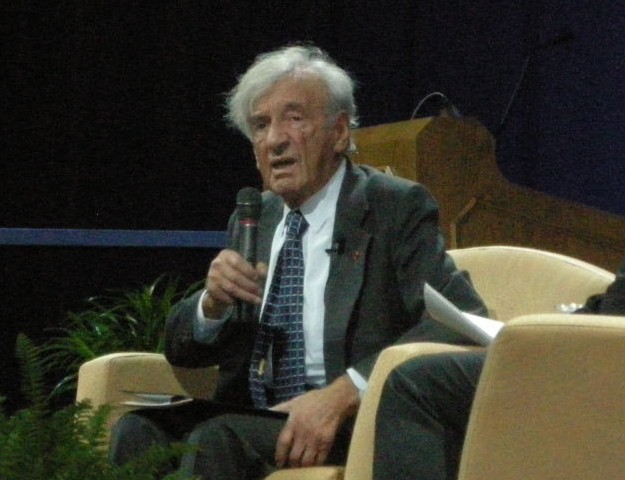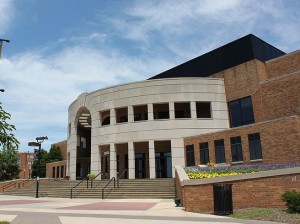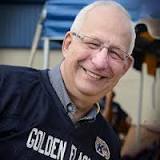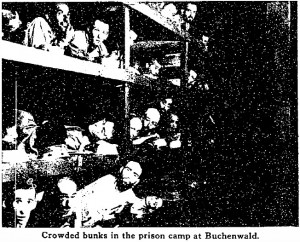Sunday, April 14th, 2013
By Carolyn Yeager

Elie Wiesel in the Kent State Univ. auditorium. Photo by Bob Jacobs
Wiesel demonstrates he has nothing to say to the world when the only news outlet to write anything at all about his speech is the Cleveland Jewish News.
This much-ballyhooed return visit to Kent State University on the April 11 anniversary of the “Buchenwald Liberation” in 1945 proved to be as “much ado about nothing” as the earlier event 68 years ago really was in retrospect.
Wiesel, 83, looking tiny and munchkin-like sitting in a big yellow chair on the stage, uttered the same phrases we’ve heard for decades and they are sounding more hollow than ever. At kentwired.com, [www.kentwired.com/latest_updates/article_25df8c65-c166-57b2-9a99-b89175cd7a3c.html] a University website, we find this summing up of the speech:
One of the major themes of Wiesel’s speech was the importance of having hope and his struggle with believing there is such a thing.
“Where there is no hope, our road and our path is to invent it,” Wiesel said. “I am here to teach you my hope because without it, I wouldn’t be here today.”
Invent it. That’s what Wiesel is good at: inventing things. He offered other similar thoughts that Kentwired considered worthy of quoting but are, in my opinion, devoid of any relevance when pondered for a few seconds, such as:
“For every word that a holocaust survivor writes, there are 10 more that haven’t been written,” said Wiesel. “Whoever listens to a witness becomes a witness.”
My comment on the first sentence: This is true of everyone’s written words. On the second: This well-worn phrase of his might be what is engraved on his tombstone – he has used it so often. Of his supposed liberation by U.S. soldiers at Buchenwald, he said:
We had lost every concept of how to feel. We did not know what it was like to be free.
“I believe in the virtue of gratitude,” Wiesel said. “Simply to say to each other, thank you.”
The first is patently false. It discounts all the uprisings that supposedly took place, all the resistance activity in the camps, and the fact that Wiesel only claims to be a detainee for one year. One doesn’t lose memory of freedom in one year. The second bit of wisdom takes care of not answering questions about Buchenwald nicely, doesn’t it.
At the Cleveland Jewish News (CJN), reporter Carlo Wolff ([email protected]) tries to build up the importance of Wiesel’s utterances by writing that he “delivered a lesson in history, literature, philosophy and morality, demonstrating his didactic prowess and his belief in the power of continuity.” I must not be intelligent enough to grasp the greatness of this speech, which Wolff tells us was appreciated by “a rapt, sell-out audience of 5000” … mostly fellow Jews, I would say. I’m convinced that Jews from all around the broader area drove to Kent to see, hear and support one of their own, who has always fought for Jewish and Israeli interests.
No one noticed Wiesel’s mic was off for first 20 minutes
But Wolff had enough of the journalist in him to tell us about the following screw-up that must have embarrassed Kent State President Lester Lefton, also a Jew and the man who invited Wiesel to the campus.
The first 20 minutes of Wiesel’s April 11 talk almost fell on deaf ears because his microphone wasn’t turned up; most followed his eloquent words as they scrolled out on giant screens flanking the stage.
According to Wolff, Wiesel didn’t refrain from his familiar finger-pointing at the Germans.
He remains appalled by the Nazis. “The enemy managed to push its crimes beyond language,” he said, explaining the difficulty he has (and the obsessions that dog him) in telling a story that can never ultimately be told.
“They had education. They had degrees. So what happened?”
What happened? Their education helped them see clearly that Jews were a danger to their German social order – and so they were, and are. It is really only Jews who commit crimes “beyond language,” if such a thing exists. It is Jews in Israel that force pornography into Palestinian homes via their television sets, at the same time they are attacking them militarily. Only Jews would dream up something like that. Likewise, only Jews would dream up the kind of concentration camp atrocity stories they tell, atrocities that Germans, Nazi or not, would never think of themselves, and therefore never do.
Tweeting the most pithy remarks of the evening
Kentwired had someone tweeting the highlights of the evening as it progressed. Here is an example of the “best of Elie Wiesel”:
- “My first passport was an American one. It’s still a symbol of human passion,” said Wiesel. “I owe America.”
- “Remember there will always be questions that have no answer,” Wiesel speaking about his experience as a Holocaust survivor.
- “I believe in memory because without it nothing is possible.”
- “The moment we stop remembering, we stop believing.”
- “Could humanity get Alzheimer’s? Could history get Alzheimer’s?”
- “History has gone beyond its limits and therefore forget it no more,” Wiesel says on making sure people don’t forget.
- “The love of children is the purest of all,” says Wiesel on trying to understand why children were killed during holocaust. [Wiesel had one child who grew up to go to work for Goldman Sachs – cy]
The following were probably answers to softball questions from the audience:
- “History has not found balance,” said Wiesel on all the chaos in the world. “We are still waiting for redemption.
- “I simply feel, again, that I have done something,” said Wiesel on his many honors and awards
- “I couldn’t be who I am if not for those books,” said Wiesel on the many books he’s written
Have you had enough? It doesn’t get any better. And it all sounds very similar to Wiesel’s speech last year at Xavier University in Cincinnati, Ohio. To sum up, Wiesel is a fading star who may not last much longer. What can last is the incredible mythology built up around him unless we work very hard to separate reality from nonsense. This takes a consistent effort, not once-in-awhile comments about the same old themes. As we can see, that is actually Wiesel’s style and it’s not very effective. When it comes to the Elie Wiesel myth, it’s the media that has done all the heavy-lifting, not E-lie himself.
This time, even the media didn’t have an appetite for it.
6 Comments
Category Featured | Tags: Tags: Buchenwald liberation, Carlo Wolff, Elie Wiesel, Kent State University, Lester Lefton, Palenstinians,
Social Networks: Facebook, Twitter, Google Bookmarks, del.icio.us, StumbleUpon, Digg, Reddit, Posterous.
Sunday, March 3rd, 2013
 By Carolyn Yeager
By Carolyn Yeager
Kent State President Lester Lefton said the university is expecting thousands of people from across the region to attend on April 11, 2013 when Elie Wiesel speaks as part of the “Presidential Speaker Series.”
The PSS is a project only in it’s second year that “seeks to bring high-profile, world-renowned experts to Kent State for serious, thought-provoking discussions and conversations,” according to the KSU website. But will there be discussion and conversation with Wiesel while he is there? I’m sure not, as Wiesel never takes any questions from an audience (or from anyone anywhere) since so many people have gotten wise to the big fraud he is perpetrating. Wiesel will be whisked in and whisked out through secret passageways with no chance for anyone to interact with him. Expect security to be very tight.
The speech will be given at Kent State’s main campus at 7 pm in the Memorial Athletic and Convocation Center (pictured right), which is located at 1025 Risman Drive, Kent, OH 44242. Detailed directions from all points can be found here. The center has a capacity for 6,327. Assuming an average of $10 per person, that could add up to $63,270. How much of that will Elie Wiesel get?
Wiesel charges a minimum of $25,000 per speech (as of a couple years ago), so those who go gaga over the man’s sentimental words, which are pretty much the same every time, should remember how much he’s being paid to utter them. If you think he ever does anything without getting the highest price the market will bear, you are just misled.
Fifteen hundred free tickets are available now to Kent State students (one ticket per student) on a first-come basis. After the first 1,500 free tickets are gone, Kent State students pay $10 for one ticket and the general admission price of $20 for any additional tickets. It costs $50 for preferred seating (where you can actually see the man). If you buy tickets for a group of 10 or more, the price goes down to $15 per ticket.
What draws Wiesel to Ohio?
It was April of last year, 2012, that Wiesel spoke at Xavier University in Cincinnati, Ohio. A little searching discovered it was sponsored by The Jewish Foundation of Cincinnati with their partners The American Jewish Committee, Cedar Village, Jewish Community Relations Council, The Jewish Federation of Cincinnati, Jewish Vocational Service and the Issac M. Wise Temple. In other words, it was an all-Jewish production.
There is undoubtedly a substantial Jewish community in Ohio that is active and well-organized. They provoke an artificial demand for Elie Wiesel, then much of the non-Jewish population is persuaded it’s a wonderful thing, too. Kent State is making every effort to build an increasingly multi-racial student population – it is evident from browsing through their website.
 Is KSU President Lefton Jewish?
Is KSU President Lefton Jewish?
It is my opinion that Lester Lefton (left) looks Jewish. Neither on his Wikipedia page, nor on his official Kent State bio page was any religion or family background given – which is highly unusual for an academic and major university president. We’re only told:
Born in Brookline, Massachusetts, Lefton completed his bachelor’s in psychology from Northeastern University in Boston in 1969.
and
Lefton resides in Kent, Ohio with his wife, Linda. They have two grown daughters and three grandsons. Mrs. Lefton is an attorney who served as a state prosecutor in South Carolina and was an academic advisor for pre-law majors at George Washington and Tulane universities
In a news article/PR release from June 21, 2011:
News of a new partnership with Siauliai University brings Kent State’s total number of international connections to approximately 200. That number includes university partnerships, exchange programs, short-term study abroad arrangements and full semester study abroad programs.
This is just one of many indications of the direction President Lefton is taking Kent State. He has also been involved in scandal over his expense account charges to the university.
Between July 2006 and July 2007 Lefton expensed $36,741.93 on entertainment and $44,249.34 on travel.[28] In a Sep 26, 2007 editorial in the Akron Beacon Journal Lefton was criticized for extensive travel to Europe, a portion of which was charged to the University, as well as hiring two additional vice presidents during a time when university tuition and fees increased for students.
Further controversy in 2007 included an agreement to pay $88,000 for a Vice President to pursue a doctorate at Case Western University. This came at a time when the university was raising student tuition and was of further concern because the same degree could be earned at Kent State University.[30]
Unfortunately, links found in footnotes 28, 29 and 30 on Lefton’s Wikipedia page are no long viable; the stories have been removed. The power of Jewish media at work?
Do we have Ohio residents willing to protest Wiesel’s appearance?
If there were a large enough group (five or more) outside the Convocation Center, or at any good campus location in the week prior to Wiesel’s speech, it could be effective. Signs are sufficient; no need to hand out flyers, but some should be available for anyone who asks for it. Two items demand attention at this time:
- The perennial question “Where is Elie’s Tattoo?” “Show the American people your tattoo, Elie!”
- What about the missing standing man in the Buchenwald Lie-beration Photo that Wiesel says he is in? We would like a comment from Wiesel on the photo in the article from the New York Times and the cover of Mel Mermelstein’s book that both show that photograph without the tall, naked man. And what about Mermelstein never mentioning Wiesel in his 1979 book about his internment at Auschwitz and Buchenwald when they were only 2 years apart in age and both were part of the Hungarian deportation in 1944?
 Copying images from this website and getting blow-ups made to paste onto posters seems to me a doable thing. It’s best to start organizing now, contacting others you know in Ohio and especially the Kent, Ohio area. I know Ohio is well-populated with men and women who consider themselves part of the Truth Movement. Heck, even Gordon Duff lives in Ohio and he fashions himself on VT as some kind of “holocaust revisionist.” He should act the part and get out there and challenge Elie Wiesel’s version of history. And remember, you don’t have to be a “holocaust denier” to object to the false testimony of Elie Wiesel! Don’t let anyone get away with labeling you with that. Be brave, and spend some of your valuable time for the truth. This may be the last opportunity you’ll have to protest Elie Wiesel in person before death turns him into an eternal martyr and saint.
Copying images from this website and getting blow-ups made to paste onto posters seems to me a doable thing. It’s best to start organizing now, contacting others you know in Ohio and especially the Kent, Ohio area. I know Ohio is well-populated with men and women who consider themselves part of the Truth Movement. Heck, even Gordon Duff lives in Ohio and he fashions himself on VT as some kind of “holocaust revisionist.” He should act the part and get out there and challenge Elie Wiesel’s version of history. And remember, you don’t have to be a “holocaust denier” to object to the false testimony of Elie Wiesel! Don’t let anyone get away with labeling you with that. Be brave, and spend some of your valuable time for the truth. This may be the last opportunity you’ll have to protest Elie Wiesel in person before death turns him into an eternal martyr and saint.
14 Comments
Category Featured | Tags: Tags: Buchenwald Lie-beration photo, Elie Wiesel, Kent State University, Mel Mermelstein, missing standing man, Pres. Lester Lefton, protest, Where is Elie's Tattoo?,
Social Networks: Facebook, Twitter, Google Bookmarks, del.icio.us, StumbleUpon, Digg, Reddit, Posterous.





